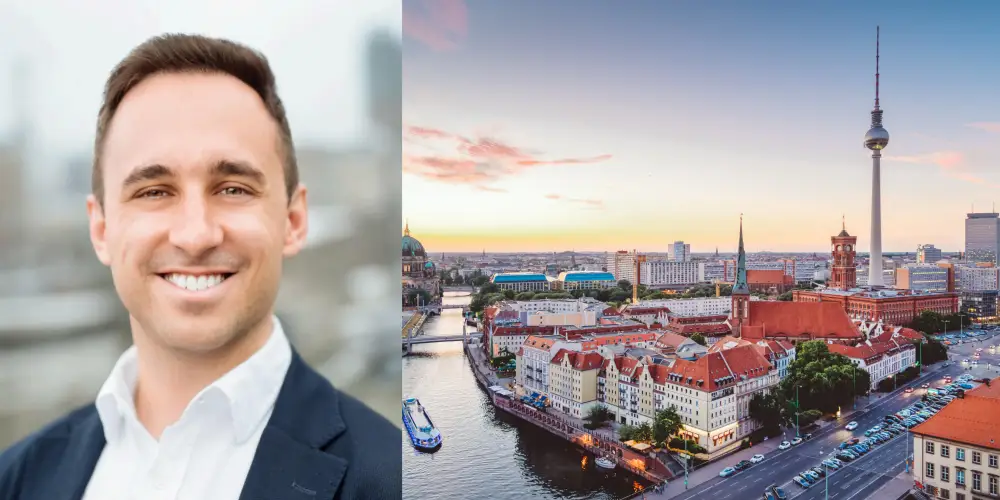I left Silicon Valley for Europe. Here’s why I chose to launch my startup in Berlin.

Maryasin chose Berlin because its tech scene was on the rise.
This as-told-to essay is based on a transcribed conversation with Ivan Maryasin, 31, about moving from the US to Germany and launching his startup, Monite, in Berlin. The following has been edited for length and clarity.
In 2014, I left Russia to do my master’s in international business at the Hult International Business School in Massachusetts.
I had a background in marketing from jobs in Russia and wanted to work in America. While studying, I started working in the IT industry, doing marketing. It was a great introduction to innovation and startups.
During my course, I transferred to the San Francisco campus and then stuck around working for multiple tech companies, designing and implementing growth strategies.
But in 2017, I moved to Germany to be closer to my then-fiancée, who I’d met in Moscow. We found it challenging to find a visa pathway that allowed her to move to the US and work as a dependant, so we both moved to Berlin. I got an EU Blue Card, and she was able to come with me as my partner with permission to work in Germany.
I already had plans to start my own company. However, as the cost of living in the US was starting to climb, I thought Europe would be a great location for a new business.
I planned to continue working for startups in Europe before launching my company. I worked in HR tech and fintech, and in 2020, I cofounded Monite, a company that enables SMB platforms like Neobanks to embed automated features for things like invoicing to support their clients.
I built the startup from the ground up to a 45-person team and raised over $17 million from investors.
I like Berlin because it’s a more affordable place to live and build a business, plus it’s well connected to the rest of Europe. Here’s how its startup ecosystem compares to Silicon Valley.
Berlin was a more affordable location to start Monite
When I left the US, I visited multiple places in Europe and spoke to people in several cities, including Zurich, Barcelona, and London, to help me decide where to move. Part of the reason I chose Berlin is because its tech scene was really on the rise.
There were a lot of founder meetups, pitch events, and accelerators in the city. Local funding was also available. At that time, I felt German funds had strong institutional support and seemed the most forthcoming in Europe. It’s very common to speak English in Berlin, and I feel this is an advantage for startups because it attracts talent from the US, UK, and beyond.
The cost of building a business in the US is high due to the cost of living and hiring. As long as I could still fundraise in the US, which became easier because of the COVID-19 pandemic, I preferred Europe. My journey in the States made it easier for me to know how the US market worked when it came to fundraising.
The cost of living in Berlin is lower. When I lived in San Francisco and the Valley, I paid more in rent and needed a car to get around. In Berlin, I mostly get around by bike. Everything is a few minutes away, and there’s less traffic.
Berlin is well-connected to Europe. You can get almost anywhere in Europe in a few hours. Having moved from California, it was wonderful to be able to see family members in Europe and go on getaways more easily.
There are some downsides to living in Berlin
It’s difficult to find US-level talent in Europe. A lot of Europeans are focused on work-life balance, but I’m a workaholic.
It’s hard to find people with the same values or who’ll know what you’re talking about when you say, “Silicon Valley benchmark.” This refers to the strong emphasis on rapid scaling, competitiveness, and continuous self-improvement. In the US, I had friends working for LinkedIn, WhatsApp, and Facebook, so I could see this benchmark in front of me.
The European investment ecosystem is much more risk-averse. In America, failure is seen as part of the game, with a strong focus on the potential upside.
In Europe, the approach tends to be more cautious and conservative, with more emphasis on mitigating risks. I do think that’s now starting to shift, but historically, that’s been one of the hardest things to overcome in the market.
I feel lucky and grateful to have raised money and for the support I’ve had. However, it’s not easy to be a founder without a background in Germany because having local connections has traditionally been valuable. In the US, it isn’t unusual to be a foreign founder.
While living in Berlin, I think it’s necessary to be strategic about getting the assets I need from other places. Monite is headquartered in Berlin, and I mostly live here, but I also travel a lot to places like the US and London to meet people and get inspiration. We also have a couple of employees in the States.
I like living in Europe, but wouldn’t rule out returning to America
Most people in Silicon Valley are focused on startups and innovation. If you’re all about work and want to focus 24/7, Silicon Valley is the place to be.
But that also depends on whether you can be there. It’s not accessible to everyone due to the high visa barriers. For example, the H-1B visa has a lottery system, and I know people who went to MIT and Harvard who either didn’t want the hassle or didn’t win the lottery, so had to leave.
Living in the Valley wasn’t for me because it meant compromising on family relationships and the ability to see friends in Europe.
That said, I won’t say I’d never go back to San Francisco. If the business required me to be in the States, I’d find a way to make it work for my family. But my preference is to live in Europe and be in the States often enough to get the benefits.






